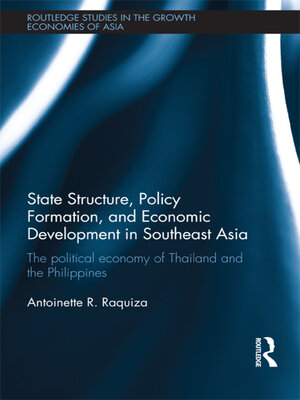State Structure, Policy Formation, and Economic Development in Southeast Asia
ebook ∣ The Political Economy of Thailand and the Philippines · Routledge Studies in the Growth Economies of Asia
By Antoinette R. Raquiza

Sign up to save your library
With an OverDrive account, you can save your favorite libraries for at-a-glance information about availability. Find out more about OverDrive accounts.
Find this title in Libby, the library reading app by OverDrive.



Search for a digital library with this title
Title found at these libraries:
| Library Name | Distance |
|---|---|
| Loading... |
Why do some small, developing countries industrialize and others don't? What factors account for different economic performance among states that are vulnerable to external shocks, crony capitalism, and political instability? This book argues that the answer lies in the structuring of state power, specifically the way different sets of governing elites – political leaders and economic technocrats – are embedded in political organisations and state institutions, and the way these elites relate to each other in the economic development policy process. Conducting a comparative historical analysis of Thailand and the Philippines, the book argues that the institutional settings of governing elites influence economic outcomes. In Thailand, political power traditionally connects to state institutions in ways that has limited the impact of political turnovers and global downturns - conducive to long-term industrial activities. In contrast, Philippine state power derives from family networks that merge social and political power, suited to fast-moving, short-term commercial interests. In focusing on this political and institutional story, the author analyses the current development dilemmas of countries, weighed down by historical legacies of unstable regimes, dependency, and social conflict, and how they are likely to develop in the future.







